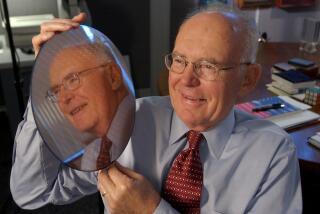Bush Advisor Rove Met Intel CEO, Held Stock
- Share via
WASHINGTON — President Bush’s top strategist, who owned more than $100,000 of Intel Corp. stock, met in March with the company’s chief executive and two lobbyists as they pushed for federal approval of a corporate merger. The administration approved the deal less than two months later.
White House officials said senior advisor Karl Rove referred the computer chip-maker’s executives to others in the administration and played no part in the approval. Rove does not recall raising the issue with the president, officials said.
“He offered no advice or counsel with regard to this decision,” White House spokesman Dan Bartlett said. Rove, however, continued to receive copies of correspondence from Intel and its trade group until the decision was made in early May, documents obtained by Associated Press show.
Rove sold all of his stock June 7, unloading a diverse portfolio of holdings in defense, high-tech, energy and banking companies valued from $1 million to $2.5 million.
Some legal experts said Rove should have removed himself from the discussion with Intel to avoid the appearance of a conflict of interest under federal ethics laws.
“I think Karl Rove has a lot of explaining to do about how this appears,” said Mike Gerhardt, a William & Mary law professor specializing in constitutional law issues relating to misconduct in the executive branch.
“If this were the Clinton administration and it was somebody who worked for Hillary or Bill, then Karl Rove himself would be denouncing it in the loudest terms possible,” Gerhardt said.
Intel chief lobbyist Jim Jarrett said he, another lobbyist and CEO Craig Barrett met separately on March 12 with Rove and Vice President Dick Cheney at the White House. The meetings, requested by Intel, also covered Bush’s energy, tax cut and education plans and were “quite useful” in the effort to win federal approval of the merger between one of Intel’s U.S. suppliers and a Dutch company, Jarrett said.
The deal required government approval because it involved foreign ownership of a U.S. computer company whose sensitive technology is relied upon by the military.






